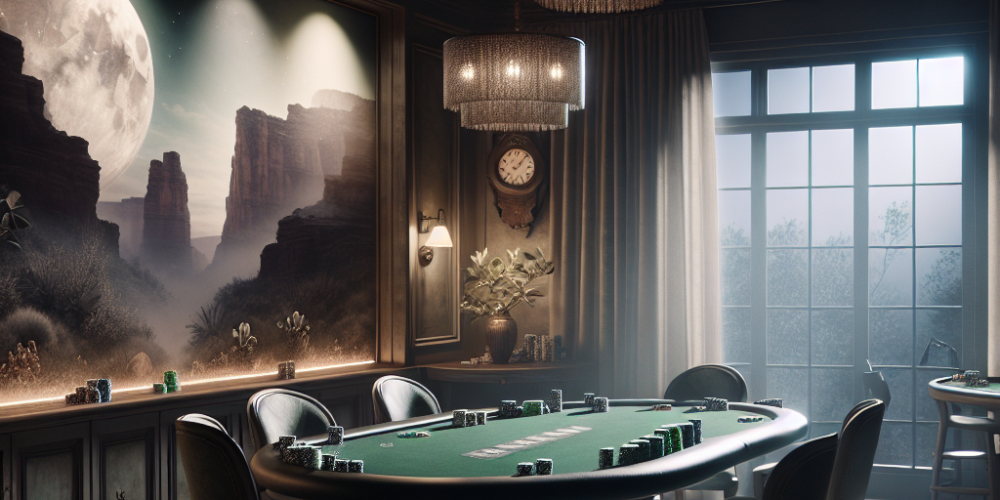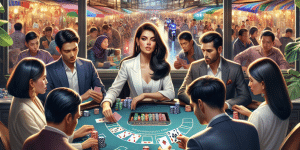A poker-filled night in Las Vegas that tested both my skill and patience.
Las Vegas nights are never dull, especially not at The Venetian’s luxurious poker room where the clink of chips becomes a symphony under the chandeliers. Yesterday was no exception. It was one of those evenings where every hand felt like it carried a bit of magic—or a curse depending on how you see it.
I was in town for a conference but couldn’t resist the lure of the poker tables. Texas Hold’em is my game of choice, and with a fresh bankroll ready to be risked, I walked into the poker room feeling optimistic. Settling into the 9 PM tournament, the atmosphere was buzzing, a mix of tourists and regulars all trying to out-bluff each other under the warm glow of table lamps.
The game started off strong. I had a couple of decent hands early on — a pair of Jacks here, a two-pair there — and managed to build a respectable stack. Poker, to me, isn’t just about the hands you’re dealt but also the stories you weave around the table. There’s Phil, a dentist from Atlanta who couldn’t help but go “all-in” on life stories every chance he got. And then there was Mina, a stoic lady with sharp eyes that missed nothing happening at the table.
As the blinds increased, so did the intensity. One memorable hand unfolded when I was dealt Ace-King suited, a beautiful start. The flop was kind, giving me another King and two unrelated low cards. Feeling confident, I raised, only to be re-raised by Mina, who had been quiet until now. I called, trying to read any tell-tale signs in her unfazed demeanor. The turn was a blank, and we both checked. The river brought an Ace, upgrading me to two pairs. I bet big, aiming to capitalize on my top two pairs, and Mina called after some deliberation. She flipped pocket Queens — beaten on the river. It was a hefty pot, and my stack looked healthier than ever.
But poker can be as cruel as it is kind. A few orbits later, my fortune reversed when I faced what every poker player fears: the bad beat. Holding a set of Eights, I felt invincible, especially after a harmless, low-card flop. Pushing my chips in after the turn, I was called by a new player, an unassuming older gentleman who had just joined. The river was a brutal Ten, completing his unlikely straight. It stung, watching my chips slide away across the green felt.
The tournament wore on, winding down past midnight. Despite the earlier setback, I was clawing my way back, leveraging tight play and capitalizing on the more aggressive punters’ mistakes. It’s something about the late hours that sharpens my focus, or perhaps it’s the coffee. Either way, hands continued to come and go, some in my favor, others not.
There was a pivotal moment though, about three hours in. Down to three tables, nursing a middling stack, I found myself heads-up in a hand that felt like a turning point. Everyone folded to me in the small blind, and looking down, I had 9-7 offsuit. Not great, but workable in a pinch. I raised, and the big blind—a young guy wearing a hoodie and sunglasses at midnight—re-raised. Deciding to call might have been a misstep influenced by fatigue, but I wanted to see the flop. It came up 9-7-5. Two pairs. This time, I went all in, only to get snap-called by hoodie guy who showed 5-5 for a set.
There it was, another beat; I was out of the tournament. Reflecting on it while walking back to my hotel room, the illuminated strip quietly buzzing as always, I realized the lesson wasn’t about the beat itself but how I reacted to it. My initial frustration faded quicker than usual, replaced by a sort of acceptance. That’s poker—a mix of skill, luck, and endurance, both emotional and mental.
Each hand teaches you something if you’re willing to learn. Last night, amidst the bluffs and bad beats, I learned that resilience isn’t just about bouncing back; it’s about acceptance, too. And maybe that’s why I keep coming back to these tables—it’s where I find my edge, and a bit of myself, too.

Garry Sputnim is a seasoned journalist and storyteller with over a decade of experience in the trenches of global news. With a keen eye for uncovering stories that resonate, Alex has reported from over 30 countries, bringing light to untold narratives and the human faces behind the headlines. Specializing in investigative journalism, Garry has a knack for technology and social justice issues, weaving compelling narratives that bridge tech and humanity. Outside the newsroom, Garry is an avid rock climber and podcast host, exploring stories of resilience and innovation.
















